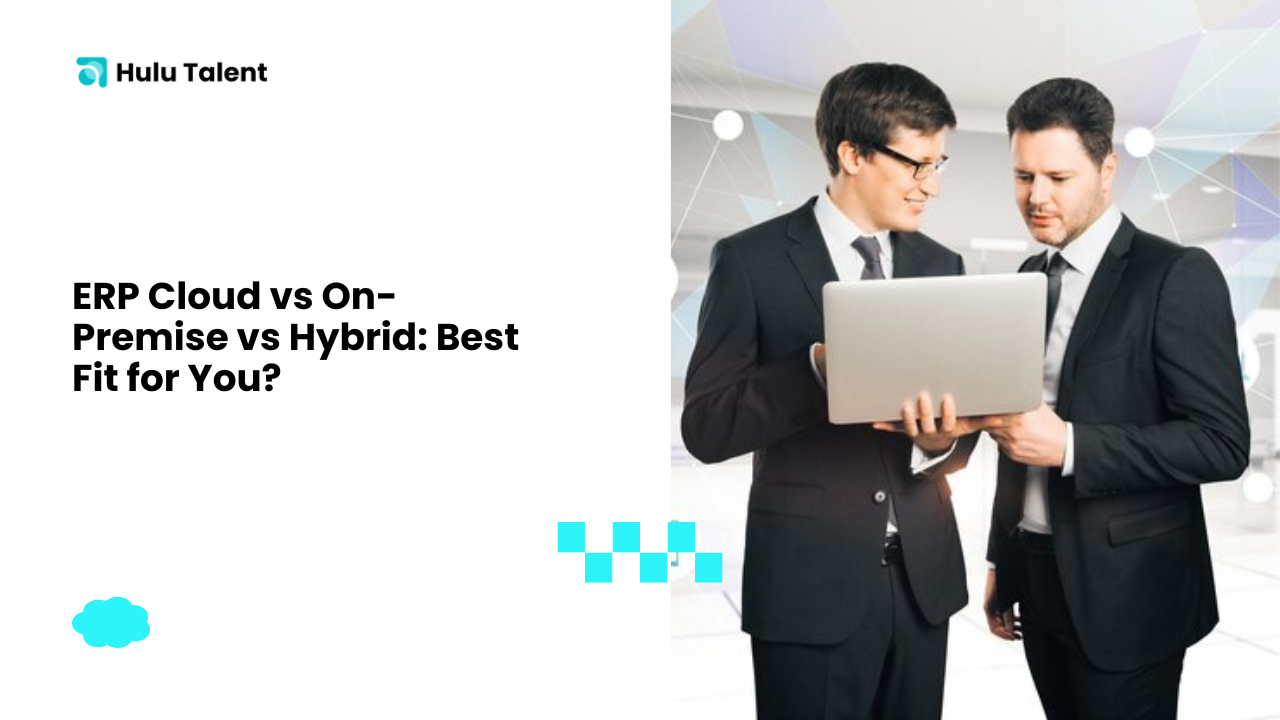Enterprise Resource Planning (ERP) systems have become essential tools for businesses looking to streamline operations, improve decision-making, and boost productivity. However, choosing the right ERP deployment model can be a daunting task. Companies must decide whether to implement a Cloud-based ERP, an On-Premise solution, or a Hybrid approach. Each option has unique advantages, costs, and technical requirements.
In this article, we’ll compare ERP Cloud, On-Premise, and Hybrid systems to help you determine the best fit for your business needs.
What is ERP Cloud?
Cloud ERP is a type of software that is hosted on a vendor’s cloud server and accessed through the internet. It offers flexibility and scalability, allowing businesses to access real-time data from anywhere.
Advantages of ERP Cloud:
- Lower upfront costs: No need for physical servers or expensive infrastructure.
- Fast implementation: Deployment is quicker compared to on-premise systems.
- Automatic updates: The software is regularly updated by the provider.
- Remote accessibility: Teams can work from anywhere using cloud access.
- Scalability: Easily scales with business growth.
Disadvantages:
- Recurring subscription fees: Cloud ERP typically requires monthly or annual payments.
- Data security concerns: Sensitive data is stored offsite, which may raise compliance issues in regulated industries.
- Limited customization: Most cloud ERPs have less flexibility in terms of deep customization compared to on-premise solutions.
What is On-Premise ERP?
On-Premise ERP is installed locally on a company’s servers and managed by the in-house IT team. It gives businesses complete control over their systems and data.
Advantages of On-Premise ERP:
- Full control of data: Suitable for industries with strict data privacy or regulatory requirements.
- High customization: Offers deeper customizations tailored to complex business workflows.
- One-time licensing fee: Avoids long-term subscription costs.
Disadvantages:
- High upfront cost: Requires investment in hardware, servers, and IT staff.
- Longer implementation time: Customization and setup take longer.
- Maintenance burden: Internal teams are responsible for updates, security patches, and technical support.
What is Hybrid ERP?
Hybrid ERP combines elements of both Cloud and On-Premise systems. Typically, core business processes run on-premise while additional tools or modules are hosted in the cloud.
Advantages of Hybrid ERP:
- Flexibility: Allows businesses to adopt cloud features gradually without abandoning legacy systems.
- Cost efficiency: Optimizes investment by only moving selected processes to the cloud.
- Custom deployment: Offers a tailored solution for businesses with mixed IT environments.
Disadvantages:
- Complex integration: Managing and syncing two environments can be technically challenging.
- Higher coordination needs: Requires strong collaboration between internal teams and cloud vendors.
- Security management: Businesses must secure both cloud and on-premise components.
Key Factors to Consider When Choosing an ERP Model
Every business is unique, so the ideal ERP model depends on your organization’s goals, size, industry, and internal capabilities. Below are some key decision-making factors:
1. Business Size and Growth Stage
- Startups and SMEs may benefit from cloud ERP due to affordability and ease of deployment.
- Larger enterprises with complex needs may opt for on-premise or hybrid to maintain control and support custom workflows.
2. Budget Constraints
- Cloud ERP minimizes initial investment but adds ongoing operational costs.
- On-premise requires heavy initial spending but may be more cost-effective long term.
3. Data Security and Compliance
- Businesses in highly regulated industries (like finance or healthcare) might prefer on-premise for better control over data.
- Cloud ERP vendors now offer robust security, but certain jurisdictions may still require local hosting.
4. IT Resources
- Cloud ERP reduces dependence on internal IT teams.
- On-premise requires dedicated staff for maintenance, upgrades, and troubleshooting.
5. Customization Needs
- If your workflows require deep integration with existing systems or proprietary features, on-premise or hybrid may be better suited.
- Standard cloud ERPs are designed for quick deployment but may lack customization flexibility.
Which One Is Right for You?
Let’s take a quick look at which type of ERP best fits specific business scenarios:
| Business Scenario | Best ERP Model |
|---|---|
| Fast-growing startup with limited IT resources | Cloud ERP |
| Large enterprise with strict data privacy requirements | On-Premise ERP |
| Company with legacy systems transitioning to digital | Hybrid ERP |
| Businesses needing mobile access and remote collaboration | Cloud ERP |
| Organizations with highly complex processes | On-Premise or Hybrid ERP |
Conclusion
Selecting the right ERP deployment model is a critical decision that affects your organization’s efficiency, cost structure, and future scalability. Cloud ERP offers ease and flexibility, On-Premise provides control and customization, while Hybrid ERP bridges both worlds with adaptability.
Before choosing, evaluate your current infrastructure, budget, business goals, and regulatory requirements. Collaborate with your IT and operations teams to assess the long-term impact of each model.
Remember, there’s no one-size-fits-all solution. The right ERP system is the one that aligns best with your company’s strategy and sets you up for growth and innovation.

